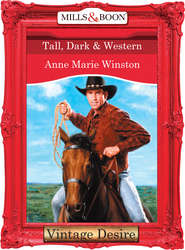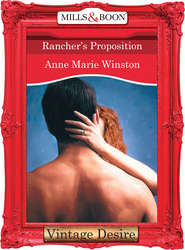По всем вопросам обращайтесь на: info@litportal.ru
(©) 2003-2024.
✖
Holiday Confessions
Автор
Год написания книги
2018
Настройки чтения
Размер шрифта
Высота строк
Поля
Cut it out, Brendan. You’re not interested.
It was a lot easier to tell himself that than it was to believe it. “Hi,” he said, unlocking the dead bolt and pulling open the door. “I didn’t expect to see you again today.”
“I brought a peace offering.”
He heard the sound of tinfoil rustling, and then an incredibly, amazingly wonderful smell assailed his nostrils.
“What is that?” he asked, inhaling deeply. “It smells heavenly.”
“Chocolate peanut-butter cookies,” she said. “My grandmother’s recipe.”
“You didn’t need to do this,” he said.
“I know.” She paused for a moment and he’d bet his last nickel that she’d shrugged. “But I really am sorry for cluttering up the hallway, and besides, I needed a good excuse to make these.”
He laughed. “If they taste as good as they smell, I can see why. Would you like to come in?”
“Oh, no, I—”
“Please,” he said. “I fully intend to dig into these cookies right away and it would be nice to share them with someone who says something besides woof.”
It was her turn to laugh. “In that case, I’d be delighted.”
Brendan stepped aside and waited until he heard her pass through the doorway and move beyond it. Closing the door, he indicated the arrangement of easy chairs, couch and tables in his living room. “Please, sit down. Would you like a drink?”
“Do you have water or milk?” she asked. “Either of those would be fine.”
“No milk,” he said. “Are you an ice or no-ice person?”
“Ice, please.”
What in the world had possessed him to invite her in? As he got a glass of water for each of them as well as a handful of napkins and returned to the living room, he decided it was the voice. He’d already decided that getting tight with the new neighbor could get sticky, but something about that sexy, low-pitched voice had completely overruled his better judgment. Setting his glass down, he reached for the coasters he kept on his coffee table and slipped one under each glass. “There.”
Tinfoil rustled again and he realized she was removing the wrapping from the cookies. “Your dogs certainly are well behaved,” she said. “When I was a child, we had a cocker spaniel who would eat anything left unattended.”
“At least he wasn’t a big dog.”
She laughed, and the sound was a warm peal of music that made him smile in return. “Oh, high places didn’t faze Ethel. That dog climbed onto chairs—and tables—and could leap right up onto the counter. Drove my mother wild.”
He was used to hearing unusual names for dogs. But…“Ethel?”
“We had Lucy, too. But Ethel was the problem child.”
He chuckled. “That’s a polite way to phrase it.”
“You have no idea,” she said in a dry tone. “Are all guide dogs this well behaved?”
“For the most part.” He nodded. “They’re still only dogs, though. Just about the time I get to thinking my dog is perfect, he or she reminds me that there is no such animal.”
“You spend a lot of time training them, though.”
“We mostly just brush up on obedience on a regular basis and work on any specific commands we want to use. The puppy raisers are the ones who get the credit for the pleasant behavior.”
“Puppy raisers?”
“The people who get them when they’re little pups. They teach them basic obedience, they socialize them around lots of people and other animals, and they teach them good house manners.”
“Like not getting food off the table.”
“Or out of the trash, or anywhere else they see it, which can be a real challenge, especially for a Labrador retriever. The dog learns not to chase cats around the house, not to jump up on people, not to get on the furniture—”
She cleared her throat. “Ah, I hate to tell you this, but there appears to be a large black dog lying smack in the middle of your love seat.”
He laughed. “Don’t ever tell anybody, please, or I’ll get fifty lashes with a wet noodle.”
“You wouldn’t get in trouble for that?”
“No. Once we are partnered with a dog, that dog becomes ours. The only time a school might step in and remove a dog from a handler is if they suspect abuse. And I personally am not aware of anyone ever doing anything to warrant something like that.”
“Feather doesn’t get on the furniture?”
“Feather,” he said, “is not about to leave my side. She’s never been interested in sleeping on the couch or the bed.”
“I noticed she went into the kitchen with you and came right back out when you did.”
“Feather’s having a hard time adjusting to retirement.”
“Do they have to retire at a certain age? She still looks pretty chipper.”
“She is pretty chipper,” he said, “for a family pet. But she’s almost ten and she’s getting arthritis. She was starting to have trouble walking as much as I needed her to. And she was starting to hesitate.”
“Hesitate?”
“Lose her confidence. She didn’t want to cross the street, even when it was clear. One day she stopped in the middle of a crosswalk and wouldn’t move. I still don’t know if it was fear, if she was in pain or if she just lost focus. But that was the day I realized I was going to have to get a new guide.”
“That must have been hard.”
“Very.” He still found it difficult to talk about, and he had to clear his throat. “We were partners for more than eight years. I hated it. Felt like I was pushing her aside. I’m sure that it felt that way to her.” He sighed. “Some people keep their retired dogs, some let them go back to the person who raised them. Some are adopted by a family member or friend or someone approved by the training school. I thought it would be too hard to let her go. But now…now I’m not so sure.” He cleared his throat. “Sorry. TMI, I’m sure.”
“It’s not too much information at all. I find it very interesting.”
He heard the ice clink in her glass as she took a sip. “Have a cookie,” she said after a moment, when he didn’t go on. “They’re always best when they’re still warm.”
“Twist my arm. Where are they?”
“On the coffee table. Ah, sort of to your right—”
“Think of the hands on a clock,” he said. “If I am facing twelve, where would the plate be?”











